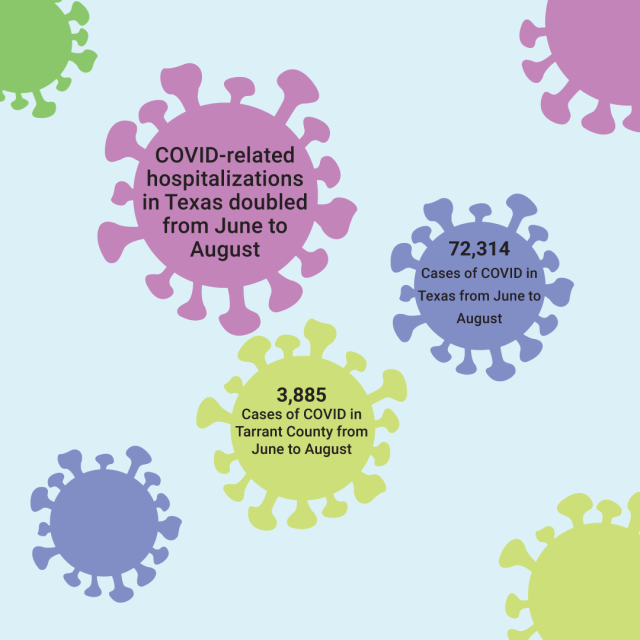XAVIER BOATNER
campus editor
xavier.boatner@my.tccd.edu
A recently published article questioned the ethics behind people wanting biological children, but is the discussion warranted?
Leo Kim, writer for Wired, published “Preferring Biological Children are Immoral” on Aug. 31. In said article, the writer argued that people who desire genetic offspring are in “conflict with other evolving values around parenting and family” and said that “insisting that you’ll only be a parent to a related child will be seen as increasingly reductive and close-minded—a stance at odds with the momentum of our expanding ethics.”
TCC attendees weighed in on the conversation and expressed their own opinions regarding the morality of preferring biologically related children. Some opinions are bit more indecisive, like Connect Campus English professor Juila Quarles said.
“It’s an interesting question,” Quarles said. “I could see an argument from both sides.”
Other opinions are more conclusive, like South Campus psychology professor Jeremy Byrd’s.
“I do not think it is immoral for people to have biological children,” Byrd said. “While I agree that it would be wonderful for more people to be open to adoption, we also have to acknowledge the clear fact that the majority of people are also going to want to have biological children.”
Byrd speculates that the want for biological children derives from an instinctual human desire to contribute to the species.
“While I am certainly not an evolutionary psychologist,” he said. “I would speculate that this common desire is a helpful mechanism for passing our genes along to the next generation. Of course, there is considerable debate about what makes an action right or wrong, but to my mind no plausible moral system can ask us to stop trying to procreate. I just don’t see any realistic chance that a moral rule against procreation would be widely accepted.”
South student Jamaica Hotep shared a similar opinion, saying it’s a genetic desire.
“There’s nothing wrong with wanting children that share your DNA,” Hotep said. “It’s definitely sad that some people want that and can’t have it, but as with everything we don’t always get what we want in life. I think it’s a biological thing. We are essentially animals, and it’s programmed into us to want to continue our bloodlines.”
Hotep felt as if people should be allowed to do as they please in terms of the type children they want and said people should not need to feel “pressured” to do something that they don’t want to do.
“People should be left to do what they want,” she said. “It would be great if more people could adopt, but they shouldn’t feel pressured to or be forced. Not everyone would be able to sustain it [as in afford adoption].”
One South student, Hannah Huggins, has experience with adoption within her own family.
“From my family’s experience, my parents wanted biological children, and they went through IVF [In Vitro Fertilization] to have me, and then they adopted my siblings because IVF is very expensive,” she said.
She speculated on reasons why people may prefer biological or adopted children.
“I think it’s moral to have biological children over adopted because it’s a natural longing to want your own family and your biological kids,” she said. “Not everyone is meant to be a parent, which is why there are so many children in the system. But adopting children is extra tedious and the children are already emotionally traumatized from separation from their parents.”
She provided some outcomes that could arise if society were to begin viewing the act of having biological children immoral.
“So, if the public starts seeing that biological children are immoral then more kids will be adopted, but then most parents can’t deal with the baggage of the children’s emotional trauma and the children will be traumatized more,” she said. “When you adopt a kid, you are basically a babysitter until the kid is 18 and wants to be with their biological family. All my siblings have a biological longing to be with their biological parents because you can’t change genetics. People should only adopt if they understand all the factors that they are committing to.”
TR Campus student Jason Hardaway, however, was heavily in favor of adoption.
“I don’t think it’s immoral for people to want biological children over adopted children,” Hardaway said. “But I think it might be morally superior to opt for adopting kids. So, I don’t think people who have kids are bad people, but I think some people who adopt kids are extraordinary people.”
Connect English professor Angela Thurman said, “I don’t think this is a question about morality- it’s a personal preference.”
A recently published article questioned the ethics behind people wanting biological children, but is the discussion warranted?
Leo Kim, writer for Wired, published “Preferring Biological Children are Immoral” on Aug. 31. In said article, the writer argued that people who desire genetic offspring are in “conflict with other evolving values around parenting and family” and said that “insisting that you’ll only be a parent to a related child will be seen as increasingly reductive and close-minded—a stance at odds with the momentum of our expanding ethics.”
TCC attendees weighed in on the conversation and expressed their own opinions regarding the morality of preferring biologically related children. Some opinions are bit more indecisive, like Connect Campus English professor Juila Quarles said.
“It’s an interesting question,” Quarles said. “I could see an argument from both sides.”
Other opinions are more conclusive, like South Campus psychology professor Jeremy Byrd’s.
“I do not think it is immoral for people to have biological children,” Byrd said. “While I agree that it would be wonderful for more people to be open to adoption, we also have to acknowledge the clear fact that the majority of people are also going to want to have biological children.”
Byrd speculates that the want for biological children derives from an instinctual human desire to contribute to the species.
“While I am certainly not an evolutionary psychologist,” he said. “I would speculate that this common desire is a helpful mechanism for passing our genes along to the next generation. Of course, there is considerable debate about what makes an action right or wrong, but to my mind no plausible moral system can ask us to stop trying to procreate. I just don’t see any realistic chance that a moral rule against procreation would be widely accepted.”
South student Jamaica Hotep shared a similar opinion, saying it’s a genetic desire.
“There’s nothing wrong with wanting children that share your DNA,” Hotep said. “It’s definitely sad that some people want that and can’t have it, but as with everything we don’t always get what we want in life. I think it’s a biological thing. We are essentially animals, and it’s programmed into us to want to continue our bloodlines.”
Hotep felt as if people should be allowed to do as they please in terms of the type children they want and said people should not need to feel “pressured” to do something that they don’t want to do.
“People should be left to do what they want,” she said. “It would be great if more people could adopt, but they shouldn’t feel pressured to or be forced. Not everyone would be able to sustain it [as in afford adoption].”
One South student, Hannah Huggins, has experience with adoption within her own family.
“From my family’s experience, my parents wanted biological children, and they went through IVF [In Vitro Fertilization] to have me, and then they adopted my siblings because IVF is very expensive,” she said.
She speculated on reasons why people may prefer biological or adopted children.
“I think it’s moral to have biological children over adopted because it’s a natural longing to want your own family and your biological kids,” she said. “Not everyone is meant to be a parent, which is why there are so many children in the system. But adopting children is extra tedious and the children are already emotionally traumatized from separation from their parents.”
She provided some outcomes that could arise if society were to begin viewing the act of having biological children immoral.
“So, if the public starts seeing that biological children are immoral then more kids will be adopted, but then most parents can’t deal with the baggage of the children’s emotional trauma and the children will be traumatized more,” she said. “When you adopt a kid, you are basically a babysitter until the kid is 18 and wants to be with their biological family. All my siblings have a biological longing to be with their biological parents because you can’t change genetics. People should only adopt if they understand all the factors that they are committing to.”
TR Campus student Jason Hardaway, however, was heavily in favor of adoption.
“I don’t think it’s immoral for people to want biological children over adopted children,” Hardaway said. “But I think it might be morally superior to opt for adopting kids. So, I don’t think people who have kids are bad people, but I think some people who adopt kids are extraordinary people.”
Connect English professor Angela Thurman said, “I don’t think this is a question about morality- it’s a personal preference.”

































